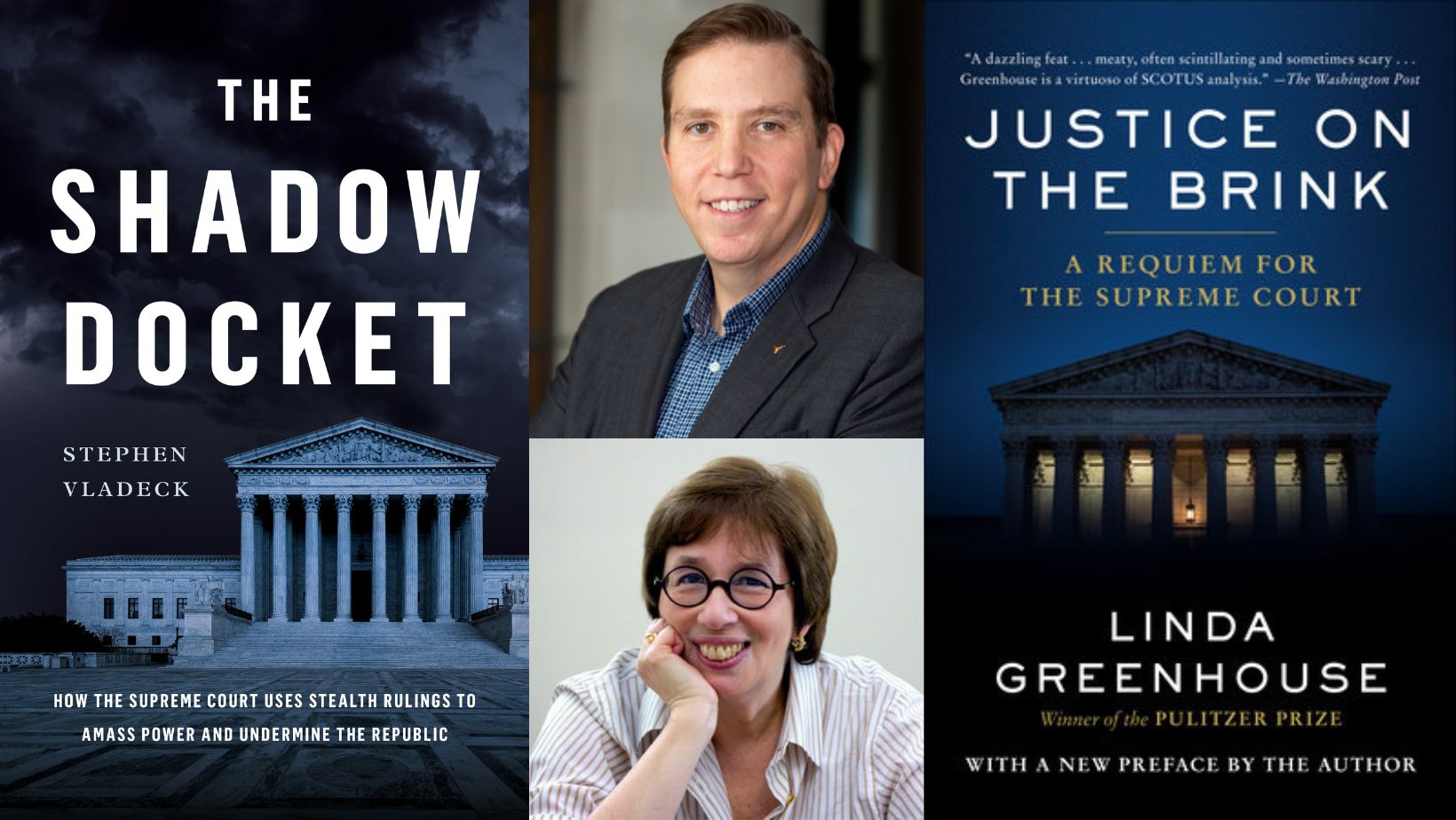The Library is delighted to partner with our friends from The Bookstore to present acclaimed legal scholar Stephen Vladeck in conversation with Pulitzer Prize winner Linda Greenhouse.
In his instant New York Times bestseller, The Shadow Docket: How the Supreme Court Uses Stealth Rulings to Amass Power and Undermine the Republic, Stephen Vladeck exposes the Supreme Court’s increasing use of unsigned, unexplained orders to change the law—all behind closed doors.
The Supreme Court has always had the authority to issue emergency rulings in exceptional circumstances. But since 2017, the Court has dramatically expanded its use of the behind-the-scenes “shadow docket,” regularly making decisions that affect millions of Americans without public hearings and without explanation, through cryptic late-night rulings that leave lawyers—and citizens—scrambling.
The Court’s conservative majority has used the shadow docket to green-light restrictive voting laws and bans on abortion, and to curtail immigration and COVID vaccine mandates. But Americans of all political stripes should be worried about what the shadow docket portends for the rule of law, argues Supreme Court expert Stephen Vladeck. In this rigorous yet accessible book, he issues an urgent call to bring the Court back into the light.
Stephen Vladeck holds the Charles Alan Wright Chair in Federal Courts at the University of Texas School of Law. His work has been published in the New York Times, the Los Angeles Times, and Slate. He has argued before the Supreme Court and has been CNN’s Supreme Court Analyst since 2013. Vladeck lives in Austin, Texas.
In her most recent book, Justice on the Brink: A Requiem for the Supreme Court (Random House, 2021), Linda Greenhouse provides unique insight into a court under stress, providing the context and brilliant analysis readers of her work in The New York Times have come to expect. In a page-turning narrative, she recounts the twelve months when the court turned its back on its legacy and traditions, abandoning any effort to stay above and separate from politics. With remarkable clarity and deep institutional knowledge, Greenhouse shows the seeds being planted for the court’s eventual overturning of Roe v. Wade, expansion of access to guns, and unprecedented elevation of religious rights in American society. Both a chronicle and a requiem, Justice on the Brink depicts the struggle for the soul of the Supreme Court, and points to the future that awaits all of us.
Linda Greenhouse is a Clinical Lecturer in Law, Knight Distinguished Journalist-in-Residence, and a Senior Research Scholar in Law at Yale Law School. She covered the Supreme Court for The New York Times between 1978 and 2008 and continues to write regularly for the newspaper’s Opinion pages. Greenhouse received several major journalism awards during her 40-year career at the Times, including the Pulitzer Prize (1998).
Her other books include a biography of Justice Harry A. Blackmun, Becoming Justice Blackmun; Before Roe v. Wade: Voices That Shaped the Abortion Debate Before the Supreme Court’s Ruling (with Reva B. Siegel); The U.S. Supreme Court, A Very Short Introduction, published by Oxford University Press in 2012; The Burger Court and the Rise of the Judicial Right, with Michael J. Graetz, published in 2016; and a memoir, Just a Journalist: Reflections on the Press, Life, and the Spaces Between, published by Harvard University Press in 2017.
In her extracurricular life, Greenhouse served from 2017-2023 as president of the American Philosophical Society, the country’s oldest learned society, which in 2005 awarded her its Henry Allen Moe Prize for writing in jurisprudence and the humanities. From 2004-2023, she served on the Council of the American Academy of Arts and Sciences. She is an honorary member of the American Law Institute, which in 2002 awarded her its Henry J. Friendly Medal. She has been awarded thirteen honorary degrees. She is a graduate of Radcliffe College (Harvard) and earned a Master of Studies in Law degree from Yale Law School, which she attended on a Ford Foundation fellowship. She lives in New Haven, Connecticut, and Stockbridge, Massachusetts.



